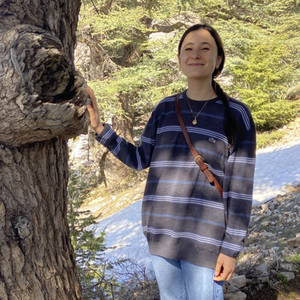Making the most of college during COVID-19
Young women from India, Indonesia, Mexico, Nigeria and the U.S. share what it’s like to attend university during a pandemic.
At the beginning of 2020, 20-year-old Nigerian student Heritage Sanmi-Lawal had taken her fourth-year law exams and was preparing to complete her degree. “2020 started with a lot of expectations for me,” Heritage explains. “I was anticipating graduating by the end of the year. However, things took an unexpected turn when, after barely two weeks of lectures, the National Universities Commission directed schools to shut down due to the rise of COVID-19 cases and we were asked to go home.”
But as Heritage returned home, the Academic Staff Union of Universities (ASUU) declared a nationwide strike, eliminating the option of remote learning for public school students in Nigeria. “I felt anxious most of 2020,” says Heritage, for whom the COVID-19 pandemic and ASUU strike meant a yearlong interruption to her education. “By now, I should be submitting applications for further studies and participating in internships, meeting new people and exploring the world.” She is not alone in feeling the emotional toll of the pandemic; more than half of undergraduate students around the world say their mental health has suffered this year.
As the world marks one year since the start of the COVID-19 crisis, we asked young women from India, Indonesia, Mexico, Nigeria and the U.S. to reflect on what it’s like to attend university during a pandemic and their advice for other students coping with the challenges of remote learning.
Averina Vayola, 20, Indonesia
(Courtesy of Averina Vayola)
University: Trisakti University
Studying: Accounting
Currently working on: Submitting my thesis. Wish me luck!
What has been the hardest part of adjusting to college life during a pandemic?
My university completely stopped in-person classes. Everything’s online. As I’m currently working on my thesis, I honestly find it super difficult to complete the requirements for graduation because I live far away from my university, and some documents need to be printed out and delivered to the college administration department. Thanks to God, I have supportive friends to help me fulfill this requirement. The shift to distance learning also has me feeling more anxious because I can’t physically meet my thesis advisor and my friends. I always have this feeling that there’s something missing in the thesis that I’m currently working on.
Is there anything you think your university or government could have done better to help students like you stay safe and continue learning during the pandemic?
I’m more concerned about those students who do not have proper access to online learning. They sometimes don’t have a computer, or they may need to share a single device with siblings. Lack of access to home internet or a computer is still a big problem in Indonesia.
Do you have any tips or techniques that helped you learn effectively from home?
Stay connected to your college friends. Take time to give them a call or FaceTime — it helps to reduce your stress so that you can learn effectively from home. My friends and I meet virtually on our leisure time to catch up with our life, work and college stories. By doing that, we recharge our positive energy and give each other the strength we need to continue our studies.
What are you most looking forward to doing once you’re able to resume your studies in person?
To be honest, deep down in my heart, I hope to have an in-person graduation ceremony. After so many ups and downs, sleepless nights and unforgettable moments, wouldn’t it be such a happy and relieving moment to meet in person and congratulate each other?
Heritage Sanmi-Lawal, 20, Nigeria
(Courtesy of Heritage Sanmi-Lawal)
University: Obafemi Awolowo University
Studying: Law
Interests: Reading, travelling, writing, research, volunteering and advocating to end gender-based violence
What measures did your university initially take to curb the spread of COVID-19?
In November 2019, I completed my fourth year law exams and was anticipating resuming in February 2020 and graduating by the end of the year. However, things took an unexpected turn when, after barely two weeks of lectures, the National Universities Commission directed schools to shut down due to the rise of COVID-19 cases and we were asked to go home. Within one week, students vacated the university and waited for further updates.
Simultaneously, public universities in Nigeria experienced massive setbacks when the Academic Staff Union of Universities (ASUU) declared a nationwide indefinite strike, which eliminated the option of online learning. Initially the strike lacked any effect because all schools were already shut down. But as private universities eased into online classes, people continued to doubt online learning would ever work for public universities due to the number of students who lacked the resources to access online classes. So, from February 2020 till December 2020, public universities halted both physical and virtual learning.
Thankfully, by the beginning of 2021, the ASUU’s demands were met and the strike was suspended. Public universities also had meetings with the federal government to address the need to improve and invest in digital learning. As a result, some public universities — including the one I attend — announced that they will begin online learning.
“Often, I had mood swings and moments of anger wondering why the Nigerian government could not consider education as a priority ...”
What has been the hardest part of adjusting to college life during a pandemic?
2020 started with a lot of expectations for me, which is why it was difficult to accept that I wouldn’t be graduating this year. By now, I should be submitting applications for further studies and participating in internships, meeting new people and exploring the world. It seemed like all my plans and calculations were useless. I felt anxious most of 2020; tracking the news and hoping to hear a resolution on how we could continue classes, ignoring my reluctance to celebrate my peers who virtually graduated from private universities. Often, I had mood swings and moments of anger wondering why the Nigerian government could not consider education as a priority and reach a favourable solution. I still think the government would have made progress with online learning if it was well discussed and constructed. They should have also eliminated further delay by ensuring the ASUU strike ended sooner.
What is your advice to other young women who may feel robbed of a college experience, or are struggling to learn from home during the pandemic?
My advice to young women who struggle with the impacts of the pandemic on their learning experience is: Surround yourself with lots of positivity and light. This may be in the form of hobbies or your circle of friends and family, listening to podcasts or meditating. Whatever it takes, don’t give up on those dreams and just keep your eyes on the prize. Also, in times like these young women should pay more attention to their mental health. Do not ignore the warning signs and be brave enough to ask for help and speak out when you feel overwhelmed.
Juliany Aime Alcocer Ángeles, 20, Mexico
(Courtesy of Juliany Aime Alcocer Ángeles)
University: Tecnológico de Monterrey
Studying: International relations
Interests: Everything related to sustainability and climate change — especially learning about other cultures and how they are attacking the climate crisis
What measures did your university initially take to curb the spread of COVID-19?
My school did a really good job of prioritizing our health as students. It was the second school in the whole country to respond to the pandemic — it closed its facilities before the government even said that this had to be done. At first I thought that it was just going to be for a month or so, but then it became clear that it wasn’t going to be over this fast.
What has been the hardest part of adjusting to college life during a pandemic?
Online school really affected my learning. It was difficult to concentrate, especially because I sometimes have classes that are four hours long with tiny breaks of five minutes between each hour. Physically, my eyes got really tired because I spent eight hours per day looking at my computer which led to headaches and a bad temper. This repeated a lot in the first three months until I went to a doctor to check my eyesight; it turned out that my eyeglass prescription changed significantly! I’m also on my university’s track team and I missed going to practice. Staying at home and having to adapt to out-of-school training was really hard.
“Online school really affected my learning. It was difficult to concentrate, especially because I sometimes have classes that are four hours long with tiny breaks of five minutes between each hour. Physically, my eyes got really tired because I spent eight hours per day looking at my computer which led to headaches and a bad temper.”
Is there anything you think your university or government could have done better to help students like you stay safe and continue learning during the pandemic?
I know that many other universities offered discounted tuition, and I think that’s really important. Most people in Mexico do not have the privilege of staying at home while having money to sustain themselves, and something concrete should be done for those families. My school did not offer discounts, but they focused instead on giving students more tools and support to continue their studies in full. For example, I know some universities did not provide biotechnology or engineering students with equipment for experiments so they couldn’t practice the practical part of their degrees. My university was good about that.
Our school administration has also shown a lot of emotional support for all of us; they have provided psychologists and also different types of workshops to entertain us such as yoga lessons, cooking lessons, art lessons and different types of dancing lessons. We have also felt support from the professors because they have been flexible with the due dates of final projects and exams. I believe that’s really important.
Has there been anything positive about being a university student during the pandemic?
The first positive thing I would mention is gratitude. I’m grateful I was able to keep studying and not have to put a pause to my career. I also took this time to focus on learning not just what I was taught in university but really trying to learn about myself. This was hard for me personally because I find it difficult to figure out where my emotions come from. But I believe if you know yourself and what you can do, you can then figure out what are the topics that you’re most interested in and how to challenge yourself once you’re out there studying them. Also, I have a new puppy now which has been a really cute source of distraction and love.
Yukta Joshi, 21, India
(Courtesy of Yukta Joshi)
College: Government Law College
Studying: Law
Interests: Debates, public speaking, yoga, meditation and learning new languages
What measures did your university initially take to curb the spread of COVID-19?
When COVID-19 first started, our university directed us to stay in our homes and not go out. Classes were suspended, and all the seminars and competitions that were planned during those periods were canceled or postponed. We were also told that classes would be in online mode indefinitely. Right now our colleges and universities have opened back up — but only for the faculty. Students are not yet allowed in person.
What has been the hardest part of adjusting to college life during a pandemic?
The hardest part was online classes, because sometimes the schedule was so irregular that you couldn’t keep up. Sometimes I had two consecutive classes with only a break of five minutes — or no break at all — in between. And staring at a screen for such a long period affects your eyes and spine and hurts your mental health as well. One thing that I appreciate is that my college started offering online examinations where you do not have to face the screen, but you can print the test from their website, write on the paper and upload it back.
What are you most looking forward to doing once you’re able to resume your studies in person?
I genuinely miss my friends, so I would like to meet up with them after this pandemic is over. When we are allowed to resume our college classes in person, I would like to continue our gatherings where we chit chat in shops and cafés for hours. We also used to take our bikes and scooters and rush over roads — I miss all of that.
What is your advice to other young women who may feel robbed of a college experience or are struggling to learn from home during the pandemic?
Today, the whole world is available to you with just one single click. So if you’re not able to learn through your college, you can learn a lot of things on YouTube, or through online courses offered by other universities. There are also online internships which are available to you. I think this is great, because in-person internships can put a lot of economic and financial strain on people who can’t afford flats or bus tickets. But if you’re interning remotely, you can work from the comfort of your home. This means a lot of time, energy and money saved.
Mirha Syed, 19, U.S.
(Courtesy of Mirha Syed)
University: University of Toronto
Studying: Political science and environmental studies
Dream career: Either in politics or at an NGO
What measures did your university initially take to curb the spread of COVID-19?
Initially our university kept us in the dark about how they were proceeding with the pandemic. We weren’t sure if they were going to switch online or if they were going to cancel certain classes and keep others in person. A lot of us felt very confused.
By mid-March the pandemic was declared a worldwide emergency and we all switched to online classes. I was living in a dorm with most of my friends, so all of us began finding out how we were going to get home. It was tricky because the decision was so rushed, we were like: “How are we supposed to get home so fast? Will the dorms stay open?” But by the end of the semester our campus was completely closed and I came back to Texas, where my parents live.
What has been the hardest part of adjusting to college life during a pandemic?
The hardest part is not being with my friends or with anyone who is my age, really. Because of where I used to live, in a dorm with almost 1,000 other students, it was a really big shift coming back home and doing everything by myself. It felt really isolating. For this reason, I feel like my university could have had a better approach to letting students connect online. They’re starting to do it now, with virtual clubs and other ways of meeting people with similar interests, but in the beginning they could have had a better way of allowing us to talk about what we were going through and what we were feeling with each other.
“The hardest part is not being with my friends or with anyone who is my age, really. Because of where I used to live, in a dorm with almost 1,000 other students, it was a really big shift coming back home and doing everything by myself. It felt really isolating.”
What has your experience been with distance learning?
It’s interesting seeing how professors are taking different approaches to teaching online. A lot of my professors have found ways to increase student participation, which is a big part of our grade, and have made it so that you have to discuss things we’re learning with other students in class. I like that they are keeping that essential part of in-person classes and encouraging us to work out problems together.
I also appreciate professors who are trying to build personal relationships with students even from a distance. One professor actually gave us his phone number, which I was shocked about. He said: “You can reach out to me anytime, you can text, call or even leave me a voicemail.” I thought that was a really good way of breaching that personal barrier even over Zoom.
How are you staying connected to your friends and classmates while social distancing?
The first thing I did was download the app Netflix Party. It lets you watch movies with your friends and talk to them at the same time. My friends and I are watching a lot of Bollywood movies right now. I also have a group chat with each of my classes so we can discuss what happens in lecture. It kind of mimics the feeling of talking in person to people in your classroom, which is a lot of fun.
What is your advice to other young women who may feel robbed of a college experience, or are struggling to learn from home during the pandemic?
It’s been so hard for all of us. What I try and tell myself all the time is that all these students — in my school and in other schools — are going through more or less the same thing that I am. So even though we’re alone, we’re unified by our experience.
I also think that if you are feeling overwhelmed with studies, you shouldn’t do more than you absolutely have to. I don’t think it’s fair to put extra pressure on yourself just because you’re a student. You might feel like you have to be on your A game and take the maximum load of classes, but the best way to be successful is actually to take on only as much as you can.
These interviews have been edited and condensed for clarity.
 Read more
Read more

















